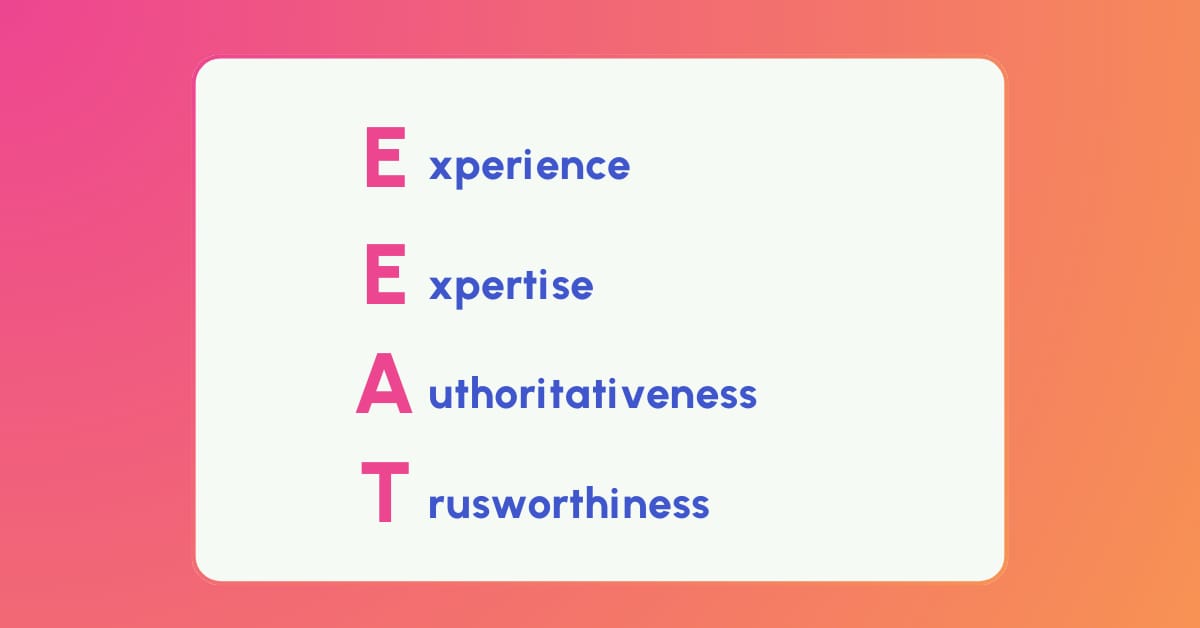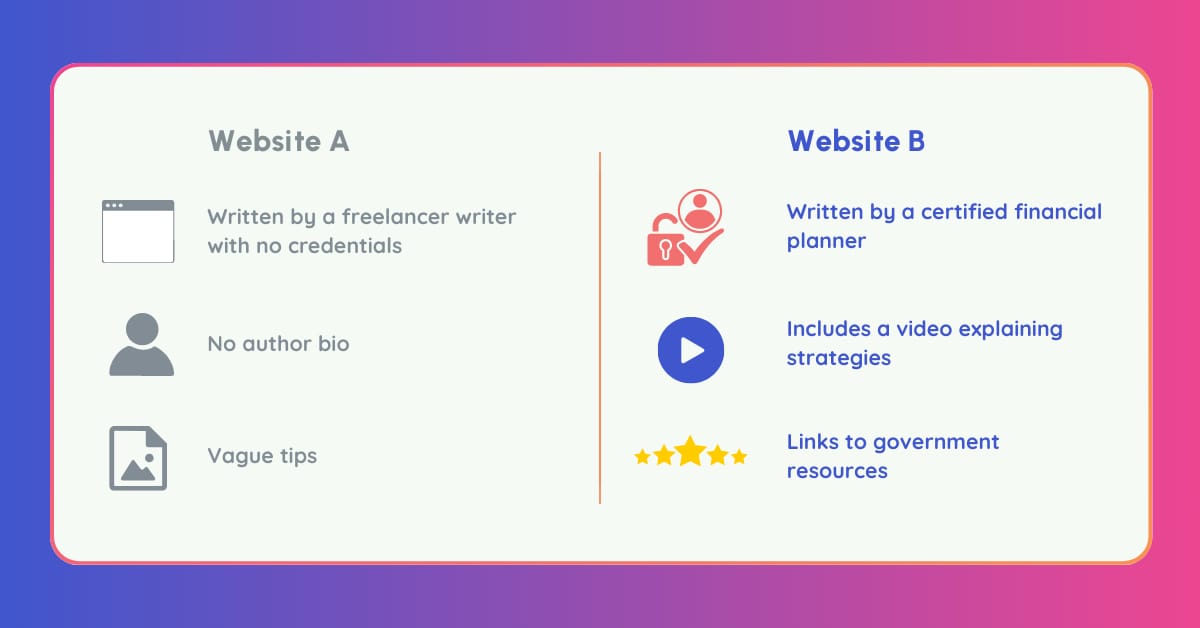What Is EEAT and Why It Matters for SEO (Traditional and AI-Driven)
Introduction: EEAT Is No Longer Optional
When it comes to search visibility, the rules of the game have changed. Search engines and AI platforms alike are no longer just crawling keywords. They are evaluating who is behind the content, why it exists, and whether it can be trusted.
That is where EEAT comes in: Experience, Expertise, Authoritativeness, and Trustworthiness.
If traditional SEO was about optimizing for algorithms, today’s SEO is about optimizing for credibility. Google and AI engines (like ChatGPT, Perplexity, or Gemini) are prioritizing content that demonstrates EEAT. Whether you are a small business trying to rank locally or an enterprise brand looking to own your industry category, mastering EEAT is critical to standing out in both Google search results and AI-generated answers.
In this blog, we will break down what EEAT means, why it matters for both traditional and AI-driven SEO, and how you can apply it strategically to future-proof your brand’s search visibility.
What Does EEAT Stand For?

Google originally introduced E-A-T in its Search Quality Rater Guidelines back in 2014. In December 2022, it was upgraded to EEAT with an added “E” for Experience.
Here is what each element means:
Experience
Demonstrates firsthand knowledge.
Example: A product review written by someone who has actually used the product.
Expertise
Shows subject-matter knowledge.
Example: A doctor writing about medical conditions, or a CPA writing about tax laws.
Authoritativeness
Establishes credibility through reputation, references, and recognition.
Example: Being cited in industry publications, having strong backlinks, or being quoted by other experts.
Trustworthiness
The foundation of EEAT.
Example: Secure websites, transparent sourcing, accurate information, and ethical business practices.
Together, these signals help Google and AI engines determine whether your content should surface in search results or be buried beneath competitors who check more credibility boxes.
Why EEAT Matters for Traditional SEO
Let us look at how EEAT impacts traditional SEO:
1. Google’s Algorithm Heavily Weighs EEAT
While EEAT is not a direct ranking factor like page speed or keyword optimization, it is baked into how Google evaluates quality. High-EEAT content earns:
Better positions in organic search results.
Increased chances of ranking for competitive queries.
Higher resilience against algorithm updates.
2. Essential for YMYL (Your Money, Your Life) Pages
If your website deals with health, finance, safety, or legal topics, EEAT is absolutely critical. Google holds YMYL sites to higher standards because inaccurate content can have serious real-world consequences.
3. Content Quality Impacts Link Building and Engagement
High-EEAT content attracts natural backlinks and shares, which reinforces SEO authority.
4. Reputation Drives Click-Through Rates
When users recognize your brand as authoritative, they are more likely to click your link instead of a competitor’s.
Why EEAT Matters for AI-Driven SEO
With the rise of AI Overviews in Google, AI-powered search engines like Perplexity, and chat-based tools like ChatGPT, optimizing for EEAT has never been more urgent. Here is why:
1. AI Summarization Rewards Credible Sources
AI engines pull content into answers based on reliability. If your content lacks EEAT, AI tools are less likely to cite or surface it in generated summaries.
2. Generative Engines Are Reputation-Driven
Unlike traditional SERPs that show 10 links, AI tools often cite just 2 to 5 sources. That means if your brand is not seen as trustworthy, you may not even get a mention.
3. Structured Data Meets EEAT
AI platforms rely on context signals like schema markup, authorship, and citations. These overlap directly with EEAT elements.
4. The Stakes Are Higher in Zero-Click Environments
When AI delivers answers directly in search, your brand visibility comes down to whether you are one of the sources cited. Strong EEAT is your ticket into those limited slots.
How to Build EEAT Into Your SEO Strategy
Here are actionable ways to strengthen EEAT across your website and content:
Add detailed author bios to blog posts.
Link to LinkedIn profiles, professional achievements, or certifications.
For sensitive topics (health, finance), ensure authors are recognized experts.
2. Incorporate Firsthand Experience
Include product photos, videos, or case studies from real usage.
Share client testimonials and success stories.
Publish behind-the-scenes insights into how you do what you do.
3. Improve On-Site Trust Signals
Use HTTPS and display trust badges.
Provide clear contact information and customer support.
Keep policies (privacy, refunds, etc.) transparent and easy to find.
Earn backlinks from high-quality sites.
Seek mentions in industry publications or podcasts.
Get reviews and ratings on trusted third-party platforms.
5. Align Content With Google’s Helpful Content Guidelines
Write content that puts the reader first, not search engines.
Avoid fluff or regurgitated information.
Update pages regularly with accurate, fresh data.
6. Optimize for AI Search
Use structured data to help AI engines understand your content.
Write FAQs (yes, like this one!) that can be pulled directly into AI responses.
Make your content easy to summarize by clearly structuring headings and answers.
Real-World Example: EEAT in Action

Let us say two websites publish an article about “best retirement planning tips.”
Website A: Written by a freelance writer with no credentials, no author bio, generic stock images, and vague tips.
Website B: Written by a certified financial planner, includes a video explaining strategies, links to government resources, and displays reviews and testimonials.
Which one do you think Google and AI will prioritize? Website B, every time
The Future of EEAT in SEO
As AI continues to evolve, EEAT will only grow in importance. Here is where it is heading:
More Personalized Search: AI engines may evaluate not just your EEAT, but also how your content resonates with specific user profiles.
Entity-Based Ranking: Google and AI may place more weight on recognized individuals, organizations, and brands as entities.
Multimodal EEAT: Images, videos, and even audio clips will contribute to EEAT signals, not just written words.
In short, the brands that win will be those that prove their expertise and trustworthiness across multiple formats and platforms.
Frequently Asked Questions About EEAT
Q1. Is EEAT a direct ranking factor in Google?
Not exactly. EEAT is not a single measurable signal but rather a framework Google uses to evaluate content quality. Indirectly, it heavily influences ranking.
Q2. How do I show “experience” if I am not a credentialed expert?
You can still highlight your firsthand perspective. Share personal stories, case studies, or customer feedback to demonstrate real-world knowledge.
Q3. What is the difference between expertise and authoritativeness?
Expertise = Your depth of knowledge on a subject.
Authoritativeness = How the world recognizes and validates that expertise.
Q4. Can small businesses compete on EEAT against big brands?
Yes. While large brands may have more recognition, small businesses can stand out by showcasing authentic experience, building local authority, and publishing unique insights.
Q5. How does EEAT affect AI search engines like Perplexity or ChatGPT?
These platforms prioritize sources they trust. Strong EEAT makes it more likely your content will be cited in AI-generated answers.
Final Thoughts: EEAT Is Your SEO Superpower
SEO is no longer just about keywords and backlinks. It is about credibility. With the rise of AI-driven search, EEAT has become the currency of trust.
If you want your brand to show up in Google, Bing, ChatGPT, Perplexity, or whatever comes next, you need to prove your experience, showcase your expertise, earn authority, and build trust.
At ScaledOn, we help businesses like yours future-proof their SEO strategy with EEAT-first content, AI search optimization, and data-driven tactics that move the needle.
Ready to boost your visibility in both traditional and AI-driven search?
👉 Let’s talk about how ScaledOn can strengthen your EEAT signals and put your brand front and center in Google and AI results. Get in touch today!


